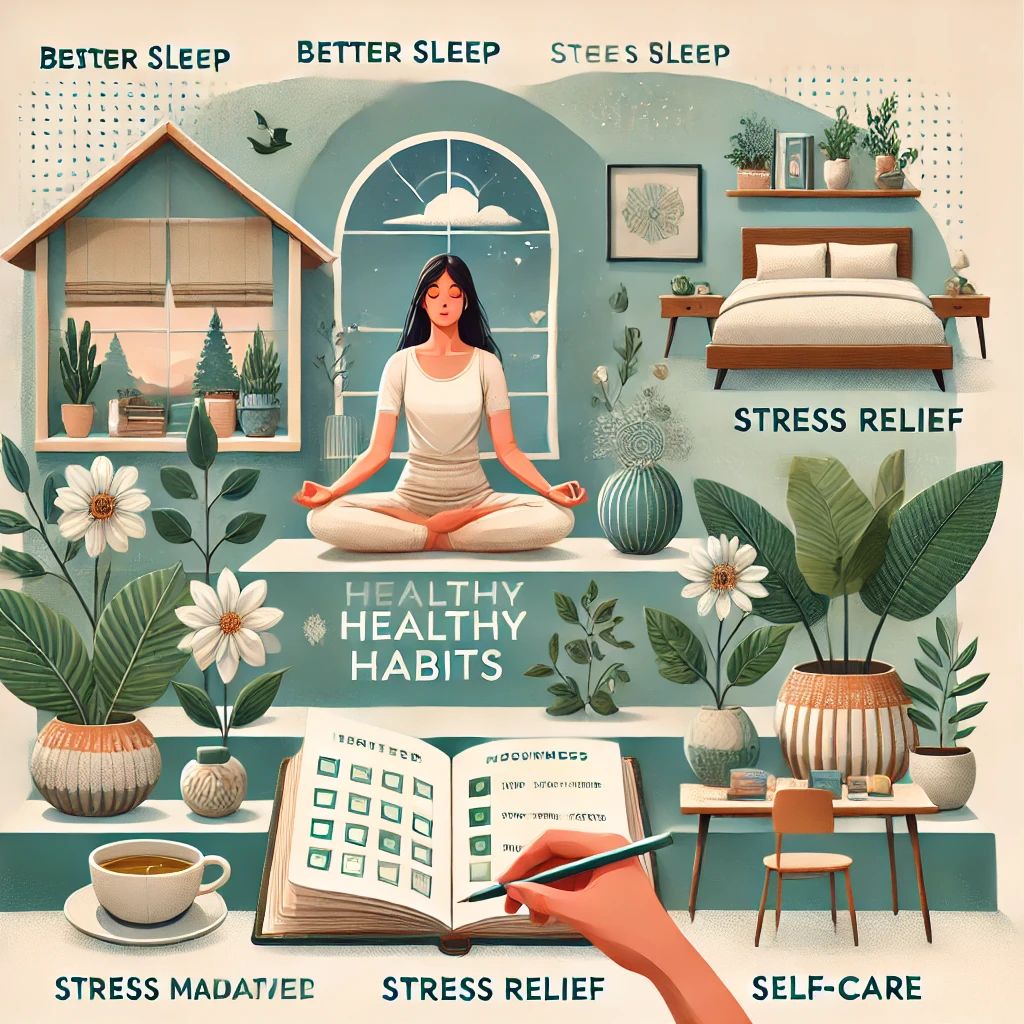Healthy Habits: A Guide to a Better Life and Mental Well-being
Healthy habits are the foundation of a long and fulfilling life. Developing and maintaining healthy routines can significantly improve your overall well-being, increase your energy levels, and reduce the risk of chronic diseases. This guide will explore various aspects of healthy habits, including diet, exercise, sleep, mental health, and social interaction, and how they contribute to a healthier lifestyle.

Types of Healthy Habits
There are several key areas where healthy habits can make a profound difference:
Diet and Nutrition: Consuming a balanced diet rich in fruits, vegetables, whole grains, lean proteins, and healthy fats provides the essential nutrients your body needs. Avoiding processed foods, excessive sugar, and unhealthy fats can help prevent obesity, diabetes, and heart disease.
Exercise and Physical Activity: Regular physical activity strengthens your muscles, improves cardiovascular health, and boosts mental health. Aim for at least 150 minutes of moderate-intensity exercise per week, including activities like walking, cycling, swimming, and strength training.
Sleep Hygiene: Quality sleep is crucial for overall health. Establishing a regular sleep schedule, creating a comfortable sleep environment, and avoiding screens before bedtime can enhance the quality of your sleep, improving memory, mood, and overall cognitive function.
Mental Health Practices: Mental well-being is just as important as physical health. Practices like mindfulness, meditation, and stress management techniques can reduce anxiety, depression, and stress levels, leading to a more balanced and peaceful life.
Social Interaction: Maintaining strong social connections can improve your emotional health and provide a support system during challenging times. Regular social activities, whether with family, friends, or community groups, can enhance your sense of belonging and happiness.
Health Benefits of Healthy Habits
Adopting healthy habits can lead to numerous benefits:
Physical Health: A balanced diet and regular exercise can help maintain a healthy weight, reduce the risk of chronic diseases, and increase longevity. Good sleep hygiene supports the immune system and overall physical health.
Mental Health: Healthy habits like exercise, proper nutrition, and mindfulness can significantly improve mental health. They can reduce symptoms of depression and anxiety, enhance mood, and increase overall life satisfaction.
Increased Energy Levels: Eating nutrient-rich foods, staying physically active, and getting enough sleep can boost your energy levels, making you feel more alert and productive throughout the day.
Improved Cognitive Function: Regular physical activity and a healthy diet are linked to better cognitive function and a lower risk of cognitive decline as you age. Good sleep also supports brain health and memory.
Enhanced Emotional Well-being: Social interactions and mental health practices can improve emotional stability, reduce stress, and increase resilience. Having a support system can help you navigate life’s challenges more effectively.
Impact on Mental Health
Healthy habits have a profound impact on mental health. Regular exercise releases endorphins, which act as natural mood lifters. A balanced diet provides the brain with the nutrients it needs to function optimally. Mindfulness and meditation practices can help calm the mind, reduce stress, and increase emotional regulation. Social interactions provide emotional support and a sense of community, which are essential for mental well-being.
Incorporating healthy habits into your daily routine can transform your life. From a balanced diet and regular exercise to good sleep hygiene and mental health practices, these habits contribute to a healthier, happier, and more fulfilling life. For more detailed information and tips on maintaining healthy habits, visit our Health Journal.
Additional links with interesting information:









Cold Water Therapy: Boosting Immunity and Reducing Stress
Does Fast Food Really Cause Premature Skin Aging?
Morning vs. Evening Workouts: Which is Better for Your Mental Energy?
Meditation and the Brain: Myth or Scientifically Proven Transformation?
Headphones and Hearing Loss: How Dangerous Is It Really?
Mental Benefits of Solo Travel: How Traveling Alone Improves Mental Health and Personal Growth
Do We Need to Exercise Every Day to Stay Healthy?
Natural Therapies and Their Impact on Health: A Natural Approach to Wellness
Detoxification and Body Shaping: Natural Teas and Drinks That Will Transform Your Look
The Personal Connection with Nature: How Nature Transforms Our Physical and Mental Health
The Power of Silence: How Quiet Moments Can Transform Your Health
Digital Detox: How Disconnecting from Technology Can Boost Creativity
Board Games: Fun and Learning with Our Kids
Reducing Blue Light Exposure: The Path to Better Mental Health and Quality Sleep
The Surprising Health Benefits of Living at High Altitudes
Intermittent Breathing: The Key to Increased Energy and Reduced Stress
Working from Home: Healthy Habits for Productivity and Well-being
Joint and Spine Health: Simple Exercises to Improve Mobility and Prevent Posture-Related Issues
Brighten Your Smile: Natural Teeth Whitening Methods You Can Try at Home
Farm Animals and Children’s Mental Health: Developing Empathy, Responsibility, and Confidence
Sport Hunting and Fishing as a Path to Mental Balance: Nature as Therapy
Darkness as a Healer: Hormonal Benefits of Controlled Exposure to Darkness
Exotic Pets and Mental Health: The Impact of Lizards, Snakes, and Parrots on Stress and Anxiety
Home Security Cameras: Your Ally for Peace of Mind and Better Mental Health
Geothermal Minerals: Skin Care and Healing Power from the Earth’s Depths
Health Benefits of Magnesium and How to Get It Through Your Diet
Spending Time in Darkness: Can It Really Improve Vision or Is It Just a Myth?